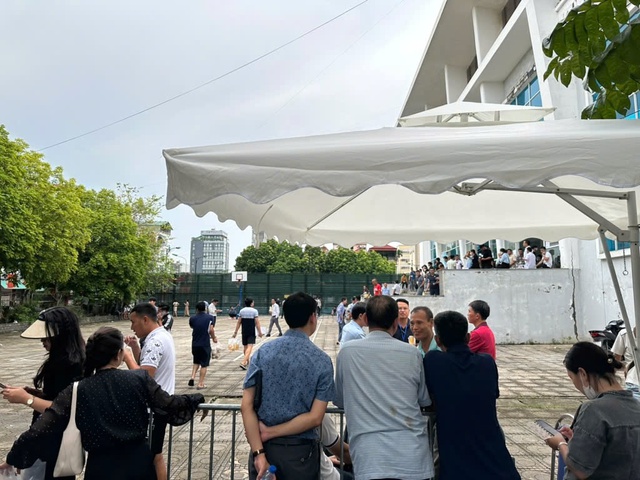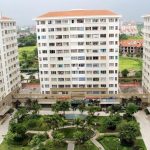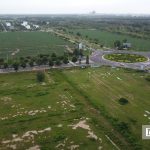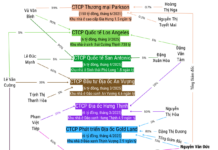
Recent land auctions in the outskirts of Hanoi, such as in Thanh Oai and Hoai Duc districts, have attracted attention due to winning bids being several times higher than the starting price. In your opinion, were there any irregularities in the bidding process and its outcome?
It is common for real estate auctions to result in prices significantly higher than the starting bid when there is high demand. However, the outcomes of the recent auctions in these areas showed unusually high prices, with the winning bids two to three times higher than the starting price, which was set too low.

Mr. Dinh Minh Tuan – Southern Region Director of Batdongsan.com.vn
Market prices are usually determined by supply and demand. Therefore, when a region experiences a two- to three-fold increase in prices in a short period while other factors influencing land value determination (infrastructure, legal, and planning) remain unchanged, it warrants scrutiny.
These auctions took place after the passage of the new law, and many localities began proposing new land price frameworks, leading to expectations of rising land prices among the public. This provided an opportunity for groups and individuals to drive up prices to abnormal levels.
However, we need to wait for the payment deadline to assess the actual number of successful bidders and determine if this was a genuine trend or merely a publicity stunt.
Even if the auction obligations are fulfilled, it does not necessarily mean that the market will immediately experience a land fever. It is still localized, which is relatively risky for investors and individuals entering the market at this stage (except for the areas surrounding Hanoi, which have shown good growth in searches and prices, while other markets across the country are still in the recovery phase with stable prices).
What drives people and investors to flock to these land auctions, and why are they willing to pay such high prices for land in areas like Thanh Oai, which is quite remote and sparsely populated, with incomplete infrastructure?
In my opinion, the number of local residents with a genuine need to participate in these auctions is relatively small compared to the number of investors, speculators, and brokers with various motives.
For investors and speculators, the primary goal is not necessarily to generate profits from these specific land plots but to create waves and inflate prices in the surrounding areas to facilitate transactions in stagnant regions. Experienced brokers, on the other hand, aim to win bids and then resell the plots at a premium of several hundred million VND.

The number of local residents with a genuine need to participate in land auctions is relatively small compared to investors and brokers. (Photo: Auction of 19 land plots in Tien Yen commune, Hoai Duc district, Hanoi)
Owning land in such locations is not suitable for commercial purposes but only for residential use. Meanwhile, the prices in neighboring areas are two to three times lower, indicating a significant risk for investors. Those following this speculative wave may find it challenging to resell the land, and it could take a decade for prices to reach the auction levels.
The core issue here is the starting price. The starting bid was extremely low, ranging from VND 7-8 million per square meter, while the market price was much higher. Specifically, the average price in Thanh Oai is around VND 27 million per square meter, but the starting bid was only VND 8 million. In Hoai Duc, the market price is about VND 43 million per square meter, yet the winning bid was only VND 7.3 million.
 Mr. Dinh Minh Tuan – Southern Region Director of Batdongsan.com.vn
Mr. Dinh Minh Tuan – Southern Region Director of Batdongsan.com.vnThis means that the cost of participating in the auction for a plot is very low, typically between VND 100-200 million. However, if successful, there is a potential profit of VND 500-600 million, which has encouraged many people without a genuine need to push the auction prices to the maximum.
Additionally, those who already own land in the vicinity may place a deposit of VND 100 million per plot to intentionally drive up prices in the surrounding areas and then exit the market during this recovery phase.
Genuine buyers, on the other hand, would typically bid around 20-30% above the market price. However, due to the large number of speculators and price manipulators, these plots may take a long time to be resold to those with a genuine need, and there is even a possibility of re-auctioning if there is a widespread failure to complete the purchase.

You mentioned that the core issue is the low starting price, and speculators are willing to place deposits to drive up land prices in the surrounding areas. It seems that participating in auctions has become a profession for them. What are your thoughts on this?
It is quite common for individuals to be hired to participate in auctions or for groups to collude to drive up land prices in a particular area. The goals of those involved vary. Genuine buyers will focus on affordable prices, while those hired to bid will aim for the highest possible price. Even some developers of projects (land plots or apartments) prefer higher prices to establish a new price benchmark officially.
With localities competing to hold auctions to increase local revenue, as is currently happening, there will likely be more individuals and organizations hired to fulfill various objectives.
What measures would you suggest to prevent the practice of placing deposits to drive up prices and then withdrawing from the auction?
To address this issue, I propose the following measures:
1. Restrict transactions after a successful auction for at least one year to reduce the number of investors participating with the intention of flipping properties for quick profits.
2. Set the starting price closer to the market value and impose a penalty of two to three times the deposit amount for withdrawing from the auction. This will help filter out those without a genuine need to participate.
3. Require proof of assets before participating in the auction, demonstrating at least 30-40% of the market value.

If the auction is successful and the winning bid is significantly higher than the starting price, it will benefit the state budget. However, the high auction price, combined with the push from investment groups/clubs afterward, has overheated land prices in the area and set a new benchmark for comparisons with other areas. Now, brokers and investors are using the winning bid of VND 133 million per square meter in Hoai Duc as a reference for other projects. What economic and social impacts do you think this will have, and how will it affect the real estate market?
After these sensational auctions, not only investors but also ordinary people will expect prices of VND 100-130 million per square meter for areas 25-30km away from the center of Hanoi. This will also set a new benchmark for land prices in this radius, leading to abnormal increases regardless of the actual value for business or residential use.
Additionally, subsequent auctions (if any) in other areas will likely see even higher prices.
Abnormally high auction prices can have far-reaching consequences for homebuyers, businesses, and even market stability.
Specifically, genuine homebuyers will find it challenging to purchase properties during this period as sellers will be inclined to raise prices above market value. Many people with financial means will rush to buy land, hoping to profit from the appreciation. Meanwhile, those without a genuine need for housing will channel their money into real estate instead of other economic activities. As a result, those who need housing may not have the financial means to buy, while those with money will invest in land.
Another consequence is the difficulty and increased costs for domestic and foreign businesses investing in large-scale projects (infrastructure, production, and business) due to more complex land clearance processes and unexpected price increases following auction results.
There could also be a ripple effect on the overall market and other segments. For example, apartment projects in central Hanoi may experience significant price increases of up to VND 100 million per square meter (due to limited land resources, high demand, and new land prices), and land plot projects could see price hikes of VND 300-400 million per square meter… These fluctuations will cause instability in the real estate market in the short term.
In your opinion, what will be the market outlook after this land auction fever, and which segments will be the next to “ride the wave”?
The real estate market has shown signs of recovery since the end of 2023 in certain prominent segments, such as detached houses and apartments. These segments, catering to genuine housing needs, have witnessed a strong increase in both searches and selling prices.
Despite the new Land Law that took effect in August and the “hot” land auctions, the market is still primarily driven by supply and demand. Capital will flow to segments with high demand at the moment.
Therefore, the apartment and detached house segments will continue to lead the recovery wave, especially with the expected increase in apartment supply in the two major cities of Hanoi and Ho Chi Minh City towards the end of the year.
 Mr. Dinh Minh Tuan – Southern Region Director of Batdongsan.com.vn
Mr. Dinh Minh Tuan – Southern Region Director of Batdongsan.com.vnThank you for your insights, Mr. Tuan!
Easier mortgage interest rates
Starting from the beginning of the year, banks have been implementing various low-interest credit packages, offering loans to pay off debts from other banks… with the aim of stimulating the demand for home loans.
Removing Land Policy Bottlenecks, Creating New Resources for Development
The passing of the Land Law by the National Assembly has been well-received by society, with expectations that policy barriers and bottlenecks will be quickly dismantled and eliminated. This will effectively utilize land resources, contributing to the creation of new resources that will promote socio-economic development…
Real Estate Expert Forecasts Booming Market for Land in 2024
Currently, land plots are still highly valued by experts as they bring high profits and minimize risks, even in a slow-paced and low liquidity market.




















